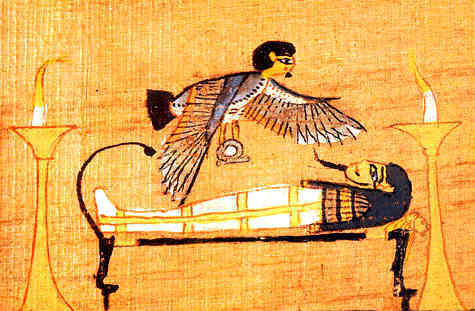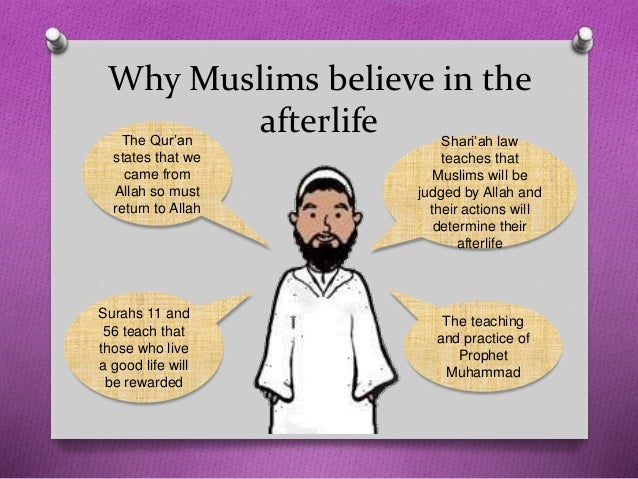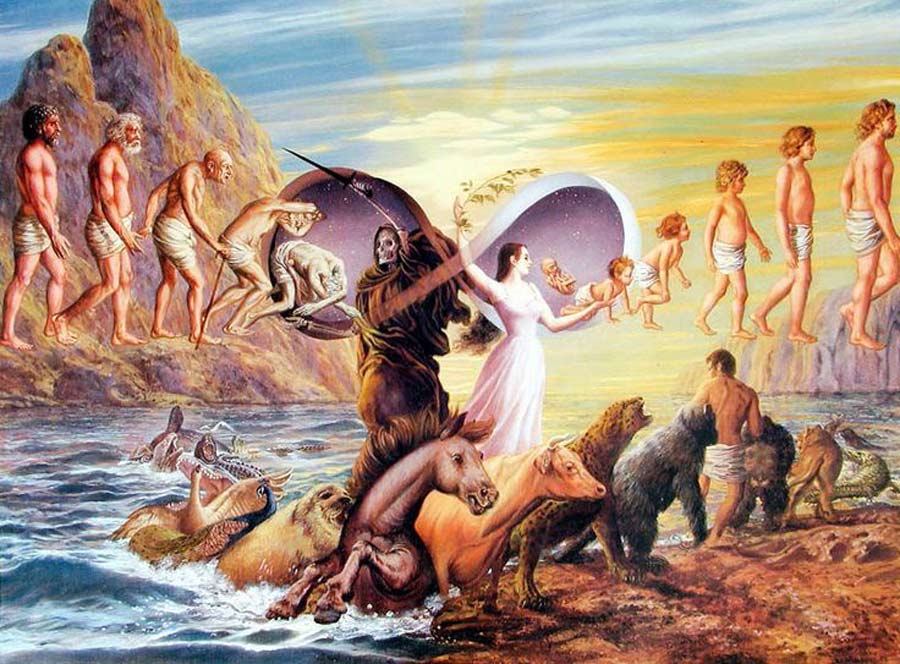If I live after I die.... Do I never die ??

It is, perhaps, the biggest mysteries of our life - what happens after life, as we know it, ends. For multiple millennia, several theories have existed, with people especially in the past, strongly believing in life after death. Whether it was reincarnation, heaven and hell, or rising in the spiritual hierarchy (a.k.a closer to God) - the beliefs are plenty. It is also one of the primary reasons why we have different ways to dispose off a corpse, either by burial, electrocution, cremation etc. for these are all in lieu of the 'life the dead would live after they die'. Paradoxical? Damn right.
We are all generally aware of the ideas of Heaven and Hell; it's common to most of the religions, just known as different names. However, there have been way cooler, diverse, and low-key crazy theories that have prevailed/are prevailing in our world. Let's take a look:
1. The Egyptians
The Egyptians took their dead seriously. They practiced the expensive and labour intensive art of mummification, as that was the only way to have an after-life. This method preserved bodies so well, that they can be viewed even today, in a relatively normal conditions. Entry to the 'Afterlife Park' was demanding. It obviously required a sin-free heart and the ability to recite the spells, passwords and formulae from the Book of the Dead. In the Hall of Two Truths, the deceased's heart was weighed against the Shu feather of truth and justice taken from the headdress of the goddess Ma'at. If the heart was lighter than the feather, they could pass on, but if it were heavier they would be devoured by the demon Ammit. No Big Deal.
 |
| Weighing the soul of the deceased |
To help them on this journey, families generally left food, jewelry, a copy of the Book of the Dead, painted gateways inside the sarcophagus (intricate coffins) that lead the soul to the afterlife.
 |
| Next flight to After Life leaving in T-2 minutes. |
They mummified animals too.
2. Islam

A central doctrine of the Quran is the Last Day, on which the world will be destroyed and Allah will raise all people and jinn from the dead to be judged. The Last Day is also called the Day of Standing Up, Day of Separation, Day of Reckoning, Day of Awakening, Day of Judgment, The Encompassing Day or The Hour.
Until the Day of Judgment, deceased souls remain in their graves awaiting the resurrection. However, they begin to feel immediately a taste of their destiny to come. Those bound for hell will suffer in their graves, while those bound for heaven will be in peace until that time.
The resurrection that will take place on the Last Day is physical, and is explained by suggesting that God will re-create the decayed body (17:100: "Could they not see that God who created the heavens and the earth is able to create the like of them"?).
On the Last Day, resurrected humans and jinn will be judged by Allah according to their deeds. One's eternal destination depends on balance of good to bad deeds in life. They are either granted admission to Paradise, where they will enjoy spiritual and physical pleasures forever, or condemned to Hell to suffer spiritual and physical torment for eternity. The day of judgment is described as passing over Hell on a narrow bridge in order to enter Paradise. Those who fall, weighted by their bad deeds, will remain in Hell forever.
3. Hinduism
Hindus extensively believe in the idea of reincarnation, as is defined by the Bhagwad Gita and the Upanishads. Afterlife for them is a 3 step process:
1) Die.
2) Spend time in Heaven/Hell based on the kind of life you lived
3) After having completed your quota of punishments or rewards, you proceed to the next life.

Now, this new life is also governed by your past deeds. Poor deeds will force you to be reborn as an animal, good deeds as a human. A life dedicated to the service of God alone would send you to God himself, for eternity, ending the cycle of life and death. It is only the body that ever dies, the soul, being indestructible, always lives on. This is where the concept of Karma originated, and we all know...
4. Beetlejuice (a movie)
Catch the whole movie in this GIF:
5. What is life, but a Dream
According to certain theories, right before you die, you see your entire life in front of you, really really slowly. For all you know, that's what you're doing right now. RIP
6. The 72 Virgin Theory

Some Islamist terrorist are driven by the notion that, after you die, 72 Virgins await you in the after-life, only if you would have served Allah well. However, some scholars claim that this translation was actually false, and instead of 'virgins', it is actually grapes that are waiting for them in the afterlife. Oops.
7. Aztecs
 |
| Future Butterflies |
8. Samuel's Theory
Samuel Murray, a facebook user, gave us a theory earlier this year (8th January, 2017).

This post went viral, and raises several questions that can, unfortunately, not be answered just yet. It is said the guy was stoned when he came up with this thought. One can only imagine how intriguing the thought would have felt at that moment.
9. Zombies
Zombies are featured widely in Haitian rural folklore as dead persons physically revived by the act of necromancy of a bokor, a sorcerer or witch. The bokor is opposed by the houngan or priest and the mambo or priestess of the formal voodoo religion. A zombie remains under the control of the bokor as a personal slave, having no will of its own.
The idea of physical zombie-like creatures is present in some South African cultures, where they are called xidachane in Sotho/Tsonga and maduxwane in Venda. In some communities, it is believed that a dead person can be zombified by a small child. It is said that the spell can be broken by a powerful enough sangoma. It is also believed in some areas of South Africa that witches can zombify a person by killing and possessing the victim's body in order to force it into slave labor.
10. Flatliners
Well this one isn't a theory, but a movie that seeks to scientifically find out what happens after the end of life. If that sounds awesome, check out this uber cool trailer:
If you ever happen to find out what happens after death, I hope you live to tell the tale!
It's 13 days until Halloween, the dead await. :)

No comments:
Post a Comment